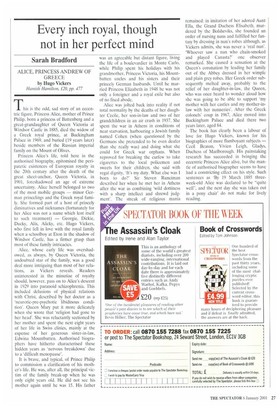Every inch royal, though not in her perfect mind
Sarah Bradford
ALICE, PRINCESS ANDREW OF GREECE by Hugo Vickers Hamish Hamilton, £20, pp. 477 This is the odd, sad story of an eccentric figure, Princess Alice, mother of Prince Philip, born a princess of Battenberg and a great-grandaughter of Queen Victoria at Windsor Castle in 1885, died the widow of a Greek royal prince, at Buckingham Palace in 1969, and buried (19 years later) beside members of the Russian imperial family on the Mount of Olives.
Princess Alice's life, told here in the authorised biography, epitomised the peripatetic existences of European royalty in the 20th century after the death of the great sheet-anchor, Queen Victoria, in 1901, foreshadowed an age of extreme uncertainty. Alice herself belonged to two of the most mobile groups — minor German princelings and the Greek royal family. She formed part of a host of princely diminutives and nicknames (fortunately for her Alice was not a name which lent itself to such treatment) — Georgie, Dickie, Ducky, Alix, Alicky, etc. Hugo Vickers, who first fell in love with the royal family when a schoolboy at Eton in the shadow of Windsor Castle, has a firmer grasp than most of these family intricacies.
Alice, whose early life was overshadowed, as always, by Queen Victoria, the undoubted star of the family, was a good deal more intriguing than most of her relations, as Vickers reveals. Readers uninterested in the minutiae of royalty should, however, pass on to Alice's descent in 1929 into paranoid schizophrenia. This included delusions of physical relations with Christ, described by her doctor as a 'neurotic-pre-psychotic libidinous condition'. Queen Mary put it more delicately when she wrote that 'religion had gone to her head'. She was reluctantly sectioned by her mother and spent the next eight years of her life in Swiss clinics, mainly at the expense of her generous sister-in-law, Edwina Mountbatten. Authorised biographers have hitherto characterised these hidden years as 'nervous breakdown' due to a 'difficult menopause'.
It is brave, and typical, of Prince Philip to commission a clarification of his mother's life. He was, after all, the principal victim of the family break-up when he was only eight years old. He did not see his mother again until he was 15. His father was an agreeable but distant figure, living the life of a boulevardier in Monte Carlo, while Philip, spent his holidays with his grandmother, Princess Victoria, his Mountbatten uncles and his sisters and their princely German husbands: Until he married Princess Elizabeth in 1948 he was not only a foreigner and a royal exile but also of no fixed abode.
Alice was jolted back into reality if not total normality by the deaths of her daughter Cecile, her son-in-law and two of her grandchildren in an air crash in 1937. She spent the war in Athens in conditions of near starvation, harbouring a Jewish family named Cohen (when questioned by the Germans she pretended to be even deafer than she really was) and doing what she could for Greek war orphans. When reproved for breaking the curfew to take cigarettes to the local policemen and sweets for their children, she said with regal dignity, 'It's my duty. What else was I born to do?' Sir Steven Runciman described her when he met her in Athens after the war as combining 'wild dottiness with a sharp intellect and shrewd judgment'. The streak of religious mania remained: in imitation of her adored Aunt Ella, the Grand Duchess Elisabeth, murdered by the Bolsheviks, she founded an order of nursing nuns and fulfilled her fantasy by dressing in nun's robes although, as Vickers admits, she was never a 'real nun'. 'Whoever saw a nun who chain-smoked and played Canasta?' one observer remarked. She caused a sensation at the Queen's coronation by leading her family out of the Abbey dressed in her wimple and plain grey robes. Her Greek order subsequently melted away, probably to the relief of her daughter-in-law, the Queen, who was once heard to wonder aloud how she was going to be able to support 'my mother with her castles and my mother-inlaw with her nunneries'. After the Greek colonels' coup in 1967, Alice moved into Buckingham Palace and died there two years later. aged 84.
The book has clearly been a labour of love for Hugo Vickers, known for his biographies of more flamboyant subjects — Cecil Beaton, Vivien Leigh, Gladys, Duchess of Marlborough. His painstaking research has succeeded in bringing the eccentric Princess Alice alive, but the mantle of authorised biographer seems to have had a constricting effect on his style. Such sentences as 'By 19 March 1885 threeweek-old Alice was declared to be "quite well", and the next day she was taken out in a pony chair' do not make for lively reading.


















































 Previous page
Previous page